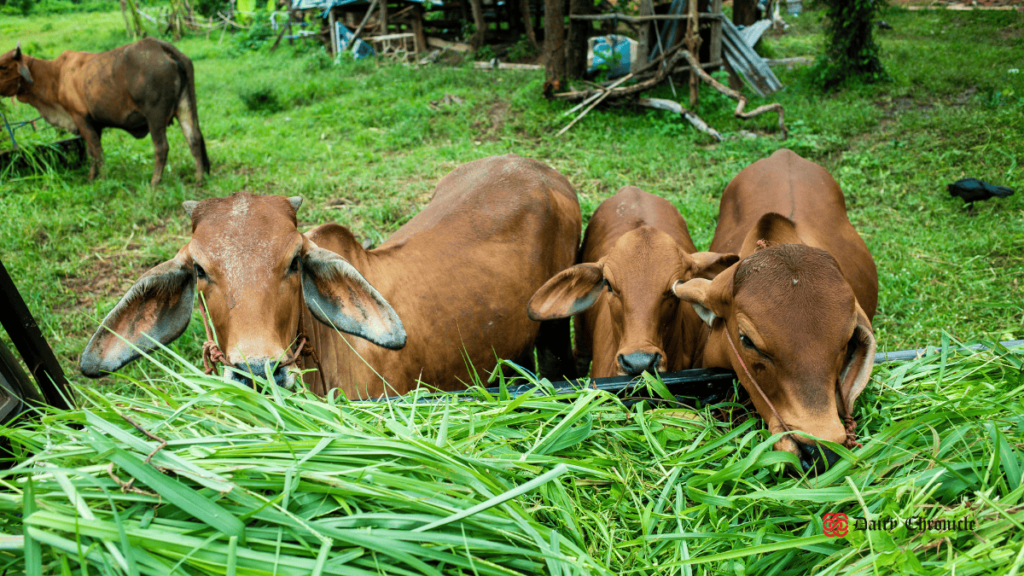The focus is on improving livestock productivity and welfare in Maharashtra by prioritising nutrition and health planning, with practical strategies for farmers to enhance animal care.
In the ever-evolving world of animal husbandry, particularly in regions like Maharashtra, ensuring optimal nutrition and health for livestock is paramount. Proper food and health planning are not just about maintaining productivity but also about enhancing the overall well-being of animals, leading to sustainable farming practices. This article explores the critical aspects of food and health planning for animals, offering actionable strategies for farmers to implement on their farms in Maharashtra.
The Importance of Nutrition in Animal Health
Nutrition is the foundation of animal health, especially in Maharashtra’s diverse agricultural landscape. A well-balanced diet tailored to the specific needs of each animal species ensures that they receive the essential nutrients required for growth, reproduction, and disease resistance.
- Balanced Diets for Livestock: Different animals have varying dietary requirements. For instance, ruminants like cattle require high-fibre diets, while poultry needs protein-rich feeds. Farmers in Maharashtra must understand these needs to provide balanced diets that support optimal health and productivity.
- Supplementation and Fortification: In some cases, regular diets may not provide all the necessary nutrients. Supplementation with vitamins, minerals, and other additives can help bridge the gap. For example, calcium supplements are vital for dairy cattle to prevent conditions like milk fever.
- Feed Quality and Safety: Ensuring the quality and safety of animal feed is crucial. Contaminated or poor-quality feed can lead to severe health issues, including digestive problems and poisoning. Regular testing and proper storage of feed can prevent such risks.
Health Planning for Disease Prevention
Alongside proper nutrition, proactive health planning is essential to prevent diseases and ensure the well-being of livestock across Maharashtra.
- Vaccination Programs: Implementing a robust vaccination schedule is a critical aspect of disease prevention. Vaccines help protect animals from common diseases, reducing mortality rates and ensuring herd health.
- Regular Health Check-ups: Routine veterinary check-ups allow for early detection of potential health issues. Regular monitoring of vital signs, body condition, and overall behaviour can help identify problems before they become severe.
- Biosecurity Measures: Preventing the introduction and spread of diseases is vital. Biosecurity measures, such as controlling the movement of animals, disinfecting equipment, and maintaining clean facilities, are essential practices on any farm in Maharashtra.
- Parasite Control: Parasites can severely impact animal health, leading to weight loss, reduced productivity, and even death. Implementing regular deworming and parasite control programs is necessary to keep animals healthy.
Strategic Planning for Animal Care
A comprehensive approach to animal care involves strategic planning that encompasses both nutrition and health, especially in the context of Maharashtra’s agricultural practices.
- Customised Care Plans: Each farm in Maharashtra is unique, and so are its challenges. Farmers should develop customised care plans that consider the specific needs of their livestock, environmental conditions, and available resources.
- Record Keeping: Maintaining detailed records of feeding routines, health check-ups, vaccinations, and treatments is essential. These records help in tracking the progress of each animal and making informed decisions about their care.
- Training and Education: Farmers and farm workers should be trained in modern animal care practices. Continuous education on the latest developments in animal nutrition and health management can significantly improve farm outcomes in Maharashtra.
Benefits of Prioritising Food and Health Planning
By prioritising nutrition and health planning, farmers in Maharashtra can reap numerous benefits:
- Increased Productivity: Healthy animals are more productive, whether it’s in terms of milk production, weight gain, or reproduction. This leads to better farm profitability.
- Reduced Veterinary Costs: Preventive care through proper nutrition and health planning reduces the need for expensive veterinary treatments, saving farmers money in the long run.
- Enhanced Animal Welfare: Prioritising animal care not only improves productivity but also ensures that animals lead healthier and more fulfilling lives, which is a growing concern among consumers and regulators.
Effective food and health planning are the cornerstones of successful animal husbandry, especially in Maharashtra. By focusing on balanced nutrition, disease prevention, and strategic care, farmers can ensure the well-being of their livestock while also enhancing farm productivity and profitability. Adopting these practices is not just beneficial for the animals but also contributes to the sustainability and success of the farming business.
